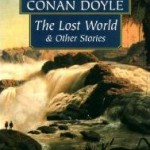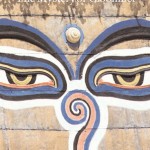
It was no easy matter to bring the Gamecock up to the island, for the river had swept down so much silt that the banks extended for many miles out into the Atlantic. The coast was hardly to be seen when the first white curl of the breakers warned us of our danger, and from there onwards we made our way very carefully under mainsail and jib, keeping the broken water well to the left, as is indicated on the chart. More than once her bottom touched the sand (we were drawing something under six feet at the time), but we had always way enough and luck enough to carry us through. Finally, the water shoaled, very rapidly, but they had sent a canoe from the factory, and the Krooboy pilot brought us within two hundred yards of the island. Here we dropped our anchor, for the gestures of the negro indicated that we could not hope to get any farther. The blue of the sea had changed to the brown of the river, and, even under the shelter of the island, the current was singing and swirling round our bows. The stream appeared to be in spate, for it was over the roots of the palm trees, and everywhere upon its muddy, greasy surface we could see logs of wood and debris of all sorts which had been carried down by the flood.
When I had assured myself that we swung securely at our moorings, I thought it best to begin watering at once, for the place looked as if it reeked with fever. The heavy river, the muddy, shining banks, the bright poisonous green of the jungle, the moist steam in the air, they were all so many danger signals to one who could read them. I sent the long-boat off, therefore, with two large hogsheads, which should be sufficient to last us until we made St. Paul de Loanda. For my own part I took the dinghy and rowed for the island, for I could see the Union Jack fluttering above the palms to mark the position of Armitage and Wilson’s trading station.
When I had cleared the grove, I could see the place, a long, low, whitewashed building, with a deep verandah in front, and an immense pile of palm oil barrels heaped upon either flank of it. A row of surf boats and canoes lay along the beach, and a single small jetty projected into the river. Two men in white suits with red cummerbunds round their waists were waiting upon the end of it to receive me. One was a large portly fellow with a greyish beard. The other was slender and tall, with a pale pinched face, which was half concealed by a great mushroom-shaped hat.
“Very glad to see you,” said the latter, cordially. “I am Walker, the agent of Armitage and Wilson. Let me introduce Dr. Severall of the same company. It is not often we see a private yacht in these parts.”
“She’s the Gamecock,” I explained. “I’m owner and captain—Meldrum is the name.”
“Exploring?” he asked.
“I’m a lepidopterist—a butterfly-catcher. I’ve been doing the west coast from Senegal downwards.”
“Good sport?” asked the Doctor, turning a slow yellow-shot eye upon me.
“I have forty cases full. We came in here to water, and also to see what you have in my line.”
These introductions and explanations had filled up the time whilst my two Krooboys were making the dinghy fast. Then I walked down the jetty with one of my new acquaintances upon either side, each plying me with questions, for they had seen no white man for months.
“What do we do?” said the Doctor, when I had begun asking questions in my turn. “Our business keeps us pretty busy, and in our leisure time we talk politics.”
“Yes, by the special mercy of Providence Severall is a rank Radical, and I am a good stiff Unionist, and we talk Home Rule for two solid hours every evening.”
“And drink quinine cocktails,” said the Doctor. “We’re both pretty well salted now, but our normal temperature was about 103 last year. I shouldn’t, as an impartial adviser, recommend you to stay here very long unless you are collecting bacilli as well as butterflies. The mouth of the Ogowai River will never develop into a health resort.”
There is nothing finer than the way in which these outlying pickets of civilisation distil a grim humour out of their desolate situation, and turn not only a bold, but a laughing face upon the chances which their lives may bring. Everywhere from Sierra Leone downwards I had found the same reeking swamps, the same isolated fever-racked communities and the same bad jokes. There is something approaching to the divine in that power of man to rise above his conditions and to use his mind for the purpose of mocking at the miseries of his body.
“Dinner will be ready in about half an hour, Captain Meldrum,” said the Doctor. “Walker has gone in to see about it; he’s the housekeeper this week. Meanwhile, if you like, we’ll stroll round and I’ll show you the sights of the island.”
The sun had already sunk beneath the line of palm trees, and the great arch of the heaven above our head was like the inside of a huge shell, shimmering with dainty pinks and delicate iridescence. No one who has not lived in a land where the weight and heat of a napkin become intolerable upon the knees can imagine the blessed relief which the coolness of evening brings along with it. In this sweeter and purer air the Doctor and I walked round the little island, he pointing out the stores, and explaining the routine of his work.
“There’s a certain romance about the place,” said he, in answer to some remark of mine about the dullness of their lives. “We are living here just upon the edge of the great unknown. Up there,” he continued, pointing to the north-east, “Du Chaillu penetrated, and found the home of the gorilla. That is the Gaboon country—the land of the great apes. In this direction,” pointing to the south-east, “no one has been very far. The land which is drained by this river is practically unknown to Europeans. Every log which is carried past us by the current has come from an undiscovered country. I’ve often wished that I was a better botanist when I have seen the singular orchids and curious-looking plants which have been cast up on the eastern end of the island.”
The place which the Doctor indicated was a sloping brown beach, freely littered with the flotsam of the stream. At each end was a curved point, like a little natural breakwater, so that a small shallow bay was left between. This was full of floating vegetation, with a single huge splintered tree lying stranded in the middle of it, the current rippling against its high black side.
“These are all from up country,” said the Doctor. “They get caught in our little bay, and then when some extra freshet comes they are washed out again and carried out to sea.”
“What is the tree?” I asked.
“Oh, some kind of teak, I should imagine, but pretty rotten by the look of it. We get all sorts of big hardwood trees floating past here, to say nothing of the palms. Just come in here, will you?”
He led the way into a long building with an immense quantity of barrel staves and iron hoops littered about in it.




